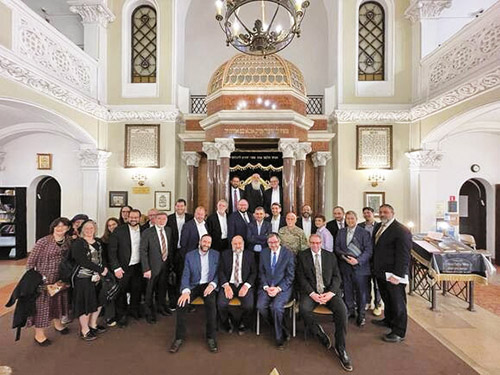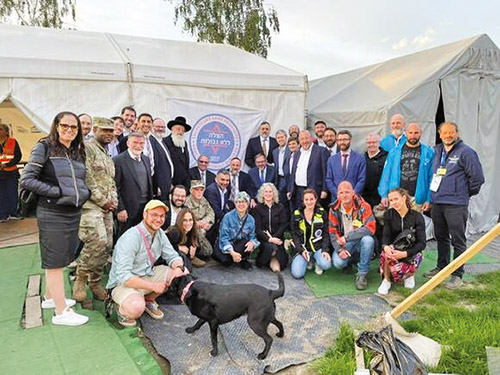
The annual conference of the Rabbinical Council of America was scheduled to be held in Chicago this year, but plans were shelved in light of the ongoing refugee crisis in Ukraine. Instead, a delegation of 25 flew to Poland—which shares a large border with Ukraine—the week of May 15, to provide, as Dr. Sara Markowitz noted, “physical, emotional and spiritual support.”
As Rabbi Andrew and Dr. Sara Markowitz, leaders of Shomrei Torah in Fair Lawn explained when interviewed by The Jewish Link, the goals of the mission were to witness firsthand what was happening on the ground, to provide support for refugees and local leaders, and to make sure that the continuing crises which had faded from the headlines would not be forgotten. As grandchildren of Holocaust survivors, both Rabbi and Dr. Markowitz felt an obligation to be involved. As Dr. Markowitz stated, “you never forget refugees, you act.”
Before departing, Rabbi and Dr. Markowitz reached out to Poland’s Jewish leaders, including Chief Rabbi Michael Schudrich and Rabbi Shalom Stambler, Chabad shaliach of Warsaw, to learn what supplies were most needed. The response was a potpourri of items, which included medical supplies and a defibrillator, bags of food, mezuzahs, tefillin, Russian/Hebrew siddurim and chumashim, and much needed funds. The Markowitzes added bags of candy and letters of chizuk to the mix, praising members of Shomrei Torah for their contributions and outpouring of support. They were especially grateful to members Rachel and Judah Rabinowitz for coordinating the efforts.

According to the couple, the trip was powerful in many ways. Given that men ages 18-60 are required by the Ukrainian government to remain in the country for the war effort, the vast majority of refugees pouring over the Polish border are women and children. According to Rabbi Markowitz, the lines appeared to go on forever, with JCC Krakow sharing that the monetary outlay for clothing, housing, medical and other supplies was $10,000 a day. Dr. Markowitz spoke of seeing women, who had lived a normal life in their homes not much earlier, arriving with just one suitcase in hand and looks of bewilderment on their faces, separated from their husbands and not knowing what kind of future lay ahead.
Rabbi Schudrich divided the refugees into three categories. The first group were those who never intended on staying in Ukraine and looked at the situation as an opportunity to start a new life. (As of May, 22,000 Ukrainians had made aliyah to Israel.) The second group were those who wanted to return to Ukraine and the comfort of familiar surroundings, but didn’t know if/when it would be safe to do so. The third group caught in this horrific situation simply didn’t know what they would do.
What helped many of them cope, for the moment at least, were the hugs they received and the outpouring of aid from so many. Seeing signs which read, “We are here to help” as they entered Poland, was tremendously uplifting. Rabbi Stambler, the Chabad shaliach, helped send 1,000 people to Israel, and has been providing daily meals to 250 refugees. When Rabbi Markowitz asked Rabbi Stambler how he had the chizuk for this, the rav noted that back in the 1960s the Lubavitcher Rebbe had a credo that when you help people, “never go halfway.” Total strangers dropped everything to help the incoming refugees. The JCC Krakow had at least 600 volunteers arriving daily.
Then there were people like Israeli Ayala Smotrich, who was supposed to climb Machu Picchu to fulfill a lifelong dream, but instead turned in her ticket and, almost from day one, remained on the Poland/Ukraine border leading
the Israeli delegation. Rabbi Markowitz proudly pointed out that other than Polish flags, the first flag seen by refugees crossing the border was one from Israel, as its team with its tent of supplies was the first outside country to respond to the crises. RCA members were instructed to provide aid to all refugees, both Jewish and non-Jewish, a clear Kiddush Hashem.

The Markowitzes shared many other poignant stories. The rabbi spoke of being puzzled by seeing an adult male carrying a baby among the mostly female refugees. The backstory was that men with three or more children were exempt from military service. The man’s wife was eight months pregnant with what would be their third child when she left the country. The child was born two weeks before Pesach. After proving he was now the father of three, the man was free to leave Ukraine the day before the Pesach began. The mohel was flown in from Israel.
In Lublin, Poland, the delegation visited the building that had housed Yeshivat Chachmei Lublin, which was led by Rabbi Meir Shapiro before it was destroyed in World War ll. There, they celebrated the dedication of a new sefer Torah. Rabbi Markowitz shared that when the yeshiva was first built, Rav Shapiro placed the pasuk “Go out my children, listen to me, the awe of Hashem is what I will teach you” on the wall. The Rav explained at the time that the pasuk begins with “lechu, not lamdu,” meaning the goal of Torah is what one does with it when you go out into the world. Rabbi Markowitz felt the delegation and all the volunteers were a fulfillment of those words, “taking the values from our communities and trying to spread support throughout the country.”
Other poignant moments included the delegation’s interactions with refugees. Using Google as a means of translation, the Markowitzes spoke about the meaningful conversations they had with the refugees. Letters written by Shomrei Torah members brought tears to the eyes of many of the women who read them, especially since shul member Natasha Zurkovsky took the time to translate them into Ukrainian.
Perhaps the most powerful moment occurred on the last day of the visit. Rabbi Markowitz explained that it’s hard to put the feelings he felt into words. The scene took place at night in a forest outside of Warsaw. Refugees, members of the Warsaw Jewish community, and those comprising the delegation joined together for a kumzitz, complete with bonfire, and sang “Oseh Shalom,” “Am Yisrael Chai” and “L’shana Haba b’Yerushalayim” before spontaneously breaking into dance.
“Knowing what took place in forests all over Poland just 80 years ago and now celebrating in the middle of one of them and trying to uplift was powerful,” he added.

The Markowitzes were asked for some final thoughts at the conclusion of their interview. The rabbi noted that after seeing the upheaval of so many, “I came back appreciative of what we have and humbled by the experience. I hope the refugees understood that there are Jews in America and all over the world praying for them.” Dr. Markowitz said, “It invigorated me to reframe what really matters and to keep things in perspective. We get caught up in our own lives when there is a whole world out there.” Rabbi Markowitz added, “We can’t say that the trip is now over. We have to think about what’s next.”
Robert Isler is a marketing researcher and freelance writer. He can be reached at robertisler23@gmail.com.











